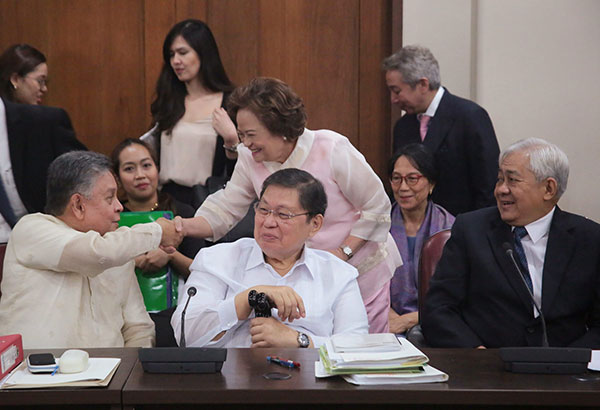Colleagues slam Chief Justice Sereno for treason, disrespect

Supreme Court Associate Justice Noel Tijam is greeted by colleague Teresita de Castro as fellow Justices Arturo Brion (center) and Francis Jardeleza look on prior to their testimony at the House of Representatives yesterday for the impeachment complaint against Chief Justice Maria Lourdes Sereno. Michael Varcas
MANILA, Philippines — Supreme Court Justice Francis Jardeleza has accused embattled Chief Justice Maria Lourdes Sereno of treason for obtaining in 2014 “through unlawful means” classified information regarding the Philippine government’s legal claims over the disputed West Philippine Sea.
“I just want to ask her: who is disloyal to the Philippine government?” he told the House committee on justice yesterday, on its last day this year of hearing the impeachment case against Sereno.
The former solicitor general wondered how the chief magistrate was able to obtain the information when this was classified as confidential and restricted, since the issue of the Ito Aba rock formation in the disputed waters was known only to lawyers in the executive department.
“My question is: how did she learn of it? And what has the judiciary have to do with our case?” Jardeleza said, noting that Sereno “twice” used the term “island” in reference to Ito Aba “when it truth and in fact it is merely just a rock formation where no life form can exist.”
He said the use of the term “island” is wrong and can already be considered treason because it runs contrary to the position of the Philippine government. An island, he explained, entitles a claimant to a 200-mile exclusive economic zone while a rock limits such to a mere 12 miles.
Discussions and disagreements, according to him, were only limited to them – the Office of the Solicitor General, Office of the President under then deputy executive secretary (and now Sandiganbayan justice) Mike Musngi and the departments of Foreign Affairs, Justice and Energy – and American lawyers the government hired to represent them before the Permanent Court of Arbitration.
“In fact, we required the American lawyers to come to the Philippines because we didn’t want the enemy to hack our communications,” Jardeleza recalled.
At one point, both parties even had to utilize an Israel-type of internal digital communication considered hack-free.
Jardeleza said he was designated by former president Benigno Aquino III to lead the Philippine delegation as the country’s chief government counsel in the case on the South China Sea filed before the arbitral court in The Hague.
Their different positions on the issue, he added, could have been the reason Sereno opposed his nomination to the SC.
Also in yesterday’s hearing, three SC justices told the House committee that for the five years she has been at the helm of the judiciary, Chief Justice Sereno never showed respect or courtesy to her senior colleagues in the SC.
“The Chief Justice is not the SC,” Justice Noel Tijam told the House committee on justice that is deliberating the impeachment complaint against the chief magistrate.
He testified that Sereno concealed from them the request for transfer of the Maute case in Mindanao.
“I’d like to decipher why the Chief Justice did not act on it promptly, being the member in charge. I was not the member in charge but I acted more promptly by circulating a memorandum to the en banc and trying to force a vote,” he related further.
Tijam opined that Sereno – the most junior in the 15-man tribunal – could have underestimated the danger posed by having the Maute cases handled by any prosecutor or judge in Mindanao, which led to the nearly two-month delay in the resolution of the petition.
“But the point is, regardless of the thoughts, the sentiments, the feelings of the Chief Justice, she should’ve taken the initiative of bringing it to the attention of the en banc because, after all, it is the en banc that will decide on the matter,” he said.
Sereno was among three magistrates opposed to the declaration of martial law in the entire region of Mindanao while 11 of their colleagues in the majority upheld the decision of President Duterte. Only Justice Marvic Leonen registered total opposition.
Senior Justice Teresita Leonardo-de Castro also bolstered Tijam’s pronouncements, saying she firmly believes the unilateral “actions of the Chief Justice showed no respect and courtesy to the SC en banc.”
“On my part, I have been calling the attention of the CJ for five years now… There was no consultation, there was no deliberation,” the jurist told the panel headed by Oriental Mindoro Rep. Reynaldo Umali.
Sereno’s term will end in 2030 after 18 years of service, the second longest in the judiciary’s history after Cayetano Arellano in the early 1900s. Former president Benigno Aquino III’s appointing her in 2012 broke the judicial hierarchy as she bypassed all of her colleagues.
Retired justice Arturo Brion echoed and corroborated their testimonies, even recalling that Sereno made it virtually impossible to have former solicitor general Jardeleza nominated to the SC by putting roadblocks.
“Small drops become a stream. And this stream, in the end, brings flood. In the beginning, you get annoyed and disgusted, and when the time comes, it becomes anger. In the end, it becomes hate,” he said in Filipino.
A smiling Umali described such pronouncements as “poetic justice” – coming from a retired justice who was waxing poetic over what Sereno’s colleagues have been dealing with all these years.
“I gave a very harsh judgment. It was malicious. The Chief Justice manipulated the JBC (Judicial and Bar Council) proceedings to exclude Jardeleza in what we call the JBC shortlist to be submitted to the Office of the President,” Brion said.
“Due process cannot be discretionary on the part of any instrumentality of government,” he added, noting that this constitutional precept is sacred in the light of Sereno’s actions where she acted as accuser, judge and executor in excluding Jardeleza.
Asked about the apparent dictatorial manner by which Sereno has been conducting herself, Jardeleza said: “To my mind, they are both possible and plausible.”
“I don’t disagree with the characterizations of House Deputy Speaker Ferdinand Hernandez. The SC en banc is very concerned about its reputation… so that people will have continued faith in the judiciary. And yes, it must follow its own rules,” he said.
Sereno’s camp denied manipulating the JBC to block Jardeleza’s nomination as Jojo Lacanilao, one of her spokespersons, claimed that the SC chief did not violate any law or rule in excluding Jardeleza.
“The exclusion of then solicitor general Jardeleza from the list was not because the Chief Justice supposedly manipulated the list. Justice Jardeleza was excluded because he did not obtain the unanimous vote required under Section 2, Rule 10 of JBC-009,” Lacanilao said in a statement.
He also belied the claim that Jardeleza was not accorded his right to due process and given an opportunity to answer the opposition to his nomination before he was excluded from the JBC shortlist.
The lawyer cited the minutes of the JBC’s executive session on June 30, 2014, which showed that Jardeleza “was given an opportunity to explain his side” but refused to do so.
Jardeleza secured a relief from the SC against his exclusion and was appointed to the high court. The alleged manipulation of the JBC list is among the 27 charges in the impeachment complaint of lawyer Lorenzo Gadon against Sereno.
Sereno’s camp also denied causing the delay in the transfer of the cases against the Maute terrorist group members from Mindanao to the Taguig regional trial court.
“As testified to by (SC clerk of court) Felipa Amana, the Chief Justice acted immediately on the matter by causing its inclusion in the agenda of the Supreme Court on 6 June 2017,” Lacanilao stressed.
He claimed that the statements of witnesses in the House hearings, including Anama and Associate Justices De Castro and Tijam, only bolstered the perjury made by Gadon in claiming that Tijam was in charge of the administrative case involving the request of Justice Secretary Vitaliano Aguirre II for the transfer of cases.
“Contrary to Gadon’s claim that Justice Tijam was the member in charge of the transfer of Maute cases, Justice Tijam revealed that he was not… and that it was his understanding that the case was assigned to Chief Justice Sereno,” he explained. – Edu Punay
- Latest
- Trending


























